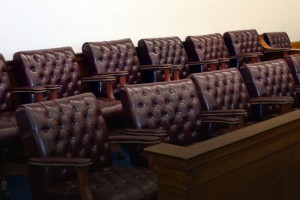 Those of us who are interested in Christian Case Making (and feel called to respond to Peter’s admonition in 1 Peter 3:15-16) usually spend time preparing to defend what we believe. We think diligently about the issues and evidences; we prepare ourselves to articulate the arguments and philosophical premises. We envision ourselves making the case for Christianity. Sometimes we even think of ourselves as characters in a courtroom setting: detectives and prosecutors who cleverly and powerfully make the case for Christ. We think about sharpening our investigative skills or our skills as presenters, hoping that our excellence in these areas will make us better Case Makers. We seldom stop to think about the fact that most cases are won or lost well before the opening statements are made by prosecutors or defense attorneys. Most cases are decided very early, at the point of jury selection.
Those of us who are interested in Christian Case Making (and feel called to respond to Peter’s admonition in 1 Peter 3:15-16) usually spend time preparing to defend what we believe. We think diligently about the issues and evidences; we prepare ourselves to articulate the arguments and philosophical premises. We envision ourselves making the case for Christianity. Sometimes we even think of ourselves as characters in a courtroom setting: detectives and prosecutors who cleverly and powerfully make the case for Christ. We think about sharpening our investigative skills or our skills as presenters, hoping that our excellence in these areas will make us better Case Makers. We seldom stop to think about the fact that most cases are won or lost well before the opening statements are made by prosecutors or defense attorneys. Most cases are decided very early, at the point of jury selection.
You can have a great case but lose miserably if you don’t have the right jury. That’s why prosecutors and defense attorneys have come to specialize (or hire experts) in jury selection. Both sides are looking for jurors who are not biased against some aspect of their case; better yet, each side would like to fill the jury with people who are inclined to agree with their position, even before they start the trial. A lot of effort is expended trying to figure out which twelve people (from the larger jury pool) should be selected. We use surveys and questionnaires and we ask important questions of each juror as we try our best to sort through the candidates, looking for presuppositional biases that may hurt our chances. No one wants to present a criminal case to a group that hasn’t been carefully screened, questioned and examined. If we aren’t careful to assemble the right jury, our efforts to articulate and argue the case will be meaningless.
I’ve often said the best jurors are simply smart and interested citizens who are humble enough not to presume they know the answer before they hear the question, and it’s important to understand these characteristics of good jurors if we hope to have an impact as Christian Case Makers. If you’ve spent time thinking through the evidence and you think you are prepared to make a case for what you believe as a Christian, take an equally conscientious approach to the selection of your potential jury. Is the person you are about to engage ready to submit to the truth? Prideful, arrogant jurors are a liability. In the years before God removed my enmity toward him, I was simply too arrogant to even consider the evidence fairly. I was not ready to sit on this jury. Is the person you are preparing to engage interested in examining the case for God’s existence or the reliability of the Bible? Prior to God’s calling in my own life, these issues couldn’t have been farther from my mind. I was completely uninterested. I was not ready to sit on this jury. Is the person you’re about to engage capable of comprehending the evidence you are about to share? Are you ready to translate difficult concepts so the person to whom you are talking can catch the ideas you are throwing? Prior to God moving in my own life, I had become intellectually lazy and never saw Christianity as a robust, intellectual worldview. I was not ready to sit on this jury.
Have you noticed the common theme here? Until God does something first to ignite the passion, interest and intellect of potential jury members, Case Makers like you and I are going to have a difficult time making a case. Only after God removed my enmity was I ready to hear what anyone had to say about Him. As I travel, work and play, I’m looking for signs of God’s involvement in the lives of non-believers in my midst. There are some people I’ve known for years who suddenly become interested in the things of God; when I see that happen, I seat them on my jury as fast as I can. God is already moving in their lives, now it’s time for me to be used as the means by which God will show Himself. I am only a small part of what God is already doing, but I am ready to play my role, helping to remove the obstacles and answer the tough questions as people consider the truth about God. If you want to be an effective Christian Case Maker, get prepared, examine the evidence, and do your homework. But don’t forget the most important part: select your jury carefully.
J. Warner Wallace is a Cold-Case Detective, a Christian Case Maker, and the author of Cold-Case Christianity, Cold-Case Christianity for Kids, and God’s Crime Scene.
Comment or Subscribe to J. Warner’s Daily Email
Save




